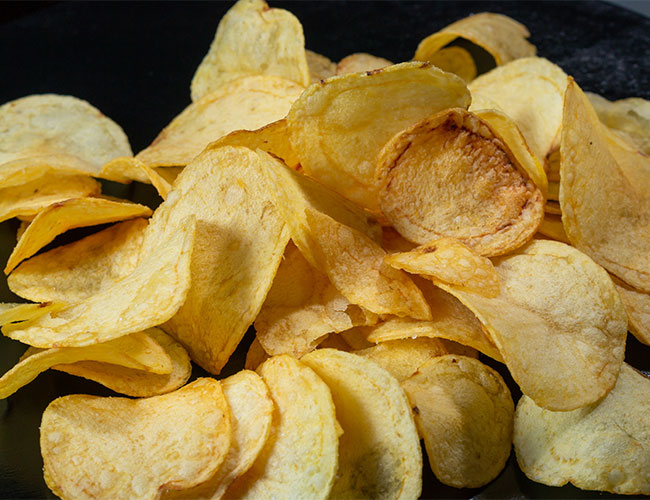
1. Potato chips
When you're craving a salty snack, a bag of potato chips might be the first thing you reach for. Unfortunately, this food and similar salty snacks are loaded with unhealthy fats, carbs, and sodium, all of which can be detrimental to your heart and your blood pressure. The high sodium content is one major reason for concern. Consuming too much salt can lead to many health issues, especially when it comes to your heart.
"Consuming salty snacks like potato chips, pretzels, and popcorn can lead to high blood pressure due to their high sodium content," Nanavati says. "Sodium causes the body to retain water, which puts extra strain on the blood vessels, ultimately leading to increased pressure in the blood." She warns that "high blood pressure is a significant risk factor for heart disease and stroke. Therefore, limiting the intake of salty snacks is crucial to maintain good health and prevent cardiovascular diseases." She recommends unsalted nuts, roasted chickpeas, air-popped popcorn, and fruit and vegetable sticks as healthy swaps.
2. Deli meat
Processed deli meat is another major offender. Options like roast beef and bologna can do some serious damage to your cardiovascular health. In fact, according to Dr. Bargout, deli meat is among the worst options out there when it comes to blood pressure and heart health. "Processed deli meat is on the top of the list for food that can increase the risk of cardiovascular events including heart attacks and stroke," he warns.
Schachter agrees, warning that "Processed meats, such as bacon, sausage, and deli meats, are high in sodium, unhealthy fats, and preservatives" and "can contribute to weight gain, high cholesterol levels, and hypertension."
Like potato chips, one of the main issues with deli meat is the sodium content. Schachter reiterates that "Consuming too much salt can increase blood pressure," pointing out that The American Health Association recommends no more than 2300mg, and under 1500mg for adults with hypertension. When you consider that just one slice of lunch meat contains around 350mg of sodium and you're likely to put even more than that on your sandwich, this is certainly concerning. When in doubt, it's best to stick to fresh, lean proteins like turkey and chicken rather than processed varieties.
3. Baked goods like cookies and cake
If you tend to go for sweet treats over salty snacks, it's also important to note that these can do damage to your heart, too. Nanavati stresses that processed, sugary baked goods like cookies and cake should be avoided if you want a healthier heart and a fitter body. It shouldn't be surprising to hear that sugar can lead to a plethora of adverse effects on your health, and that includes potentially higher blood pressure.
"Sugary snacks like cookies, candy, and cake often contain calories but lack essential nutrients," Nanavati says. "Overindulging in sugary snacks can lead to weight gain, another risk factor for high blood pressure. Moreover, sugary snacks can cause sudden spikes in blood sugar levels, contributing to high blood pressure." Luckily, there are a lot of healthy alternatives that can satisfy your sweet tooth without putting your health at risk.
4. Canned food
Canned food is another highly processed, high-sodium food that health experts recommend cutting out of your diet if you struggle with hypertension. "High sodium, sugar, or preservatives are sometimes added to canned foods to improve their flavor," Nanavati says, warning that these additives can increase the risk of high blood pressure and heart disease.
Nanavati notes one particular factor to be wary of: a chemical known as BPA. "Many canned foods contain Bisphenol-A (BPA), a chemical that is known to cause hormone disruption and has been linked to a variety of health issues," she explains.
If you still want to buy canned foods, she recommends looking for items with minimal added sugar or sodium, and paying attention to serving size. "Aim for a variety of fresh fruits and vegetables that are packed without added sauces or syrups," she suggests.
5. Breakfast cereal
Cereal may make a convenient, tasty breakfast, but it could come with a cost. Just like baked goods and other sweet treats, breakfast cereal is typically loaded with sugar, which could pose a significant risk to your heart health and your weight loss goals.
"Cereals are often very high in sugar and low in fiber, which means they pass through your digestive system quickly. Fiber keeps you feeling fuller for longer, which helps control your food intake and prevent weight gain. It also causes slower digestion which means a slower release of energy into your bloodstream throughout the day," Moody says. And don't forget how sugar can affect your heart; as mentioned above, blood sugar spikes can lead to higher blood pressure and an increased risk of heart disease. If you can't give up on cereal altogether, opt for healthier, high-fiber options.
6. Frozen meals
Frozen meals are some of the most convenient (and oftentimes tastiest) options out there—but regularly indulging in them likely isn't the worth the toll they can take on your heart. Like many of the items on this list, Geiger points out that these meals are typically "loaded with sodium," posing a significant risk when consumed in excess.
Frozen meals are often prepared with preservatives and flavor enhancers to extend their shelf life and enhance taste. Sodium is a common component in these additives, and its excessive presence in these meals can have adverse effects on cardiovascular health. In fact, Geiger points out that a single microwave breakfast bowl can contain nearly 800mg of sodium, leaving very little room for additional salt intake throughout the day if you stay within the recommended limit of 1500mg for adults with hypertension.
Geiger advises individuals to be vigilant about reading nutrition labels and choosing options that align with heart-healthy recommendations. Opting for whole, unprocessed foods is a key strategy to mitigate the risks associated with frozen breakfasts.


